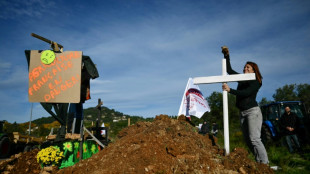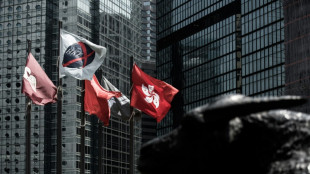

Underground life endures near Ukraine front
Sergiy Miliutin was meant to be handing out competition awards to children at a nuclear bunker instead of sitting at his desk dealing with emergencies as his south Ukrainian city slowly lost its lights.
But the burly and cheerful deputy mayor of Kryvyi Rig has grown used to his phone constantly demanding his attention after eight months of war.
The Russians have been pushed back from the steel-producing city's edges to about an hour's drive away.
They have responded by pummelling Ukraine's energy grid with missiles in an attempt to beat the country into submission ahead of the cold winter months.
Yet the latest news from the front is increasingly upbeat.
Ukraine's month-long counteroffensive has forced Russian-installed officials to start evacuating the nearby regional capital Kherson that they seized in early March.
And as he navigates problems above ground, the competition continues in an adapted underground bunker, once a grimly-lit concrete basement but now a place where Ukrainians come to reaffirm their commitment to life despite the draining conflict.
Miliutin sounded philosophical as he munched on his meat wrap while tapping away at his phone to see which districts of the city needed emergency help.
"Of course, physically I am tired," the 45-year-old, an engineer by training, admitted.
"But I've reached a point where I just survive on my drive. You have to stay level-headed and save your strength. No one knows how long this will all last."
- 'Not forgotten' -
In the bunker -- built in the 1960s to withstand the impact of a nuclear attack during the Cold war -- the children's competition continues without the deputy mayor.
Kryvyi Rig has transformed it and similar underground dwellings into arenas and performance venues that gather hundreds for weekend events, in a bid to give their children a semblance of normality.
The boys and girls proudly paraded around in white martial arts costumes for the city's finals of the annual hand-to-hand combat competition.
Their exhausted-looking parents leaned against walls and slumped on benches, watching their progeny flip and flop around on square mats.
A host excitedly announced each bout on a loudspeaker whose echoes rang out well above ground.
In Miliutin's absence, the event was being overseen by the national coach of Ukraine's hand-to-hand combat team.
"Psychologically, it is important for the children to see that the grown-ups have not forgotten about them," coach Anatoliy Voloshyn told AFP above all the noise.
"They haven't been to school in months. They needed to feel like they matter again."
- 'Please, don't relax' -
The main bunker in Kryvyi Rig has hosted everything from pop concerts to comedy shows from the Studio Kvartal 95 TV crew that launched the career of now-President Volodymyr Zelensky.
Like other Ukrainian industrial cities, life is finely balanced between exultation and despair as the war drags on.
The approach of each missile or -- with growing frequency -- suicide drone is announced by the soul-crushing wails of air raid sirens that ring out day and night.
News of each downed missile is celebrated on social media by a nation that has moved a large part of its daily life online.
Some sections of big cities stand either in ruins or without lights and power.
Others are filled with shoppers or smiling couples that push prams or walk dogs and ignore the air alarms.
The deputy mayor is no longer sure how he can make people take the sirens as seriously as they did in the first days of war.
"We keep constantly reminding people -- please, please, please, don't relax," Miliutin said.
Russia decided quickly to focus its long-range air assault on big buildings that could potentially house officials or troops.
Schools and cinemas no longer function across Ukraine because of the Russian bombing threat.
Miliutin said it took a few months for everyone to realise that something resembling normal life could resume down in the long-forgotten bunkers dotting the country since Soviet times.
"Everyone is very cheerful down here," coach Voloshyn said. "It's as if there were no war."
A.Weber--MP




